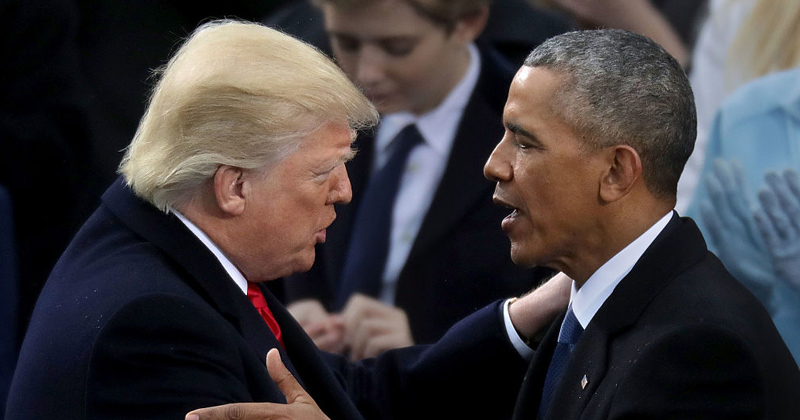- FBI Asks Justice Department to Reject Trump’s Wiretapping Claim
FBI Director James Comey has asked the Justice Department to publicly refute President Donald Trump’s explosive, unsubstantiated accusation that Barack Obama tapped his phone during last year’s election campaign, US media reported on Sunday.
Comey’s extraordinary measure questioning the president’s truthfulness provides an indication of the implications of Trump’s incendiary claim about his predecessor. The department has not made any statement.
Trump’s aides were scrambling on Sunday to limit the political fallout of Trump’s accusation 24 hours after it was made — admitting it was still unproven, and calling on Congress to investigate.
Citing still undefined “reports” of “politically motivated investigations,” press secretary Sean Spicer said Trump was calling on Congress to “determine whether executive branch investigative powers were abused in 2016.”
Trump spokeswoman Sarah Sanders echoed those comments.
“If this happened,” she told ABC, “this would be the greatest abuse of power, and overreach, that has ever occurred in the executive branch.”
Trump, who has returned to Washington from a weekend at his Mar-a-Lago estate in West Palm Beach, Florida, has not publicly commented further on his allegations.
On Saturday, he tweeted, “How low has President Obama gone to tap my phones during the very sacred election process. This is Nixon/Watergate. Bad (or sick) guy!”
He provided no evidence to back up the claim.
Watergate is the generic term for the scandal that brought down president Richard Nixon in 1974. It began with the revelation of a secret wiretap in the offices of the Democratic National Committee at Washington’s Watergate Hotel.
Obama, via a spokesman, denied Trump’s new allegation as “simply false.”
US presidents can’t legally order such wiretaps, which require the approval of a federal judge and reasonable grounds for suspicion.
Obama’s director of national intelligence James Clapper told NBC there was “no such wiretap activity mounted against the president-elect at the time as a candidate or against his campaign.”
– President ‘furious’ –
Trump’s comments appear to have been based on unverified claims made by the right-wing Breitbart News outlet. His chief strategist, Steve Bannon, used to run it.
The New York Times, citing senior US officials, first reported that Comey believes Trump’s claim to be false.
The FBI director made the request on Saturday because “there is no evidence to support it, and it insinuates that the FBI broke the law,” the paper reported the officials as saying.
Previous media reports have indicated that US prosecutors investigated communications between a server registered to the Trump Organisation and a Russian bank.
In his roles as a reality TV showman and presidential candidate, and now as president, Trump has repeatedly embraced conspiracy theories, including the suggestion that Obama was not born in America. Obama was born in Hawaii, a US state.
Trump leveled the latest charges in a string of tweets early Saturday, at the end of a week in which his administration was battered by controversy over links between his advisors and Russian officials.
Trump was said to be furious that good reviews of his maiden speech to Congress on Tuesday were overtaken by a series of revelations about aides’ meetings with Russian officials.
The president was also said to be angry that Attorney General Jeff Sessions recused himself from any campaign or Russia-related investigations.
Sessions’ recusal came after it emerged that, speaking under oath during his Senate confirmation hearings about campaign contacts with Russia, he failed to disclose two meetings with Moscow’s ambassador in Washington.
Amid that and several other revelations of Trump aides holding meetings with Russian officials, the White House has denied allegations of collusion.
– Diversionary tactics –
US intelligence agencies have concluded that Russian President Vladimir Putin approved a campaign to meddle in last November’s presidential election in a bid to tilt it in Trump’s favour.
Former CIA director Leon Panetta on Sunday accused Trump of diversionary tactics.
“They are trying to obfuscate and trying to cover up. They are trying to somehow raise other issues,” he told CBS.
“In the end, it is going to be the truth that will determine what is involved here, and not tweets, but the truth.”
However, the Republican chair of the House Permanent Select Committee on Intelligence, Devin Nunes, said his panel would look into Trump’s claims.
“The Committee will make inquiries into whether the government was conducting surveillance activities on any political party’s campaign officials or surrogates, and we will continue to investigate this issue if the evidence warrants it,” he said in a statement.
Democrats and a growing number of Republicans in Congress have called for the appointment of a special prosecutor and a bipartisan inquiry to look into the Russia issue.
With approval ratings already low, Trump could do without another scandal in his young presidency.
Republicans have largely stood behind him, hoping he will enact tax cuts and other policies they favor.
But some Republican lawmakers appear to be losing patience with the drama of Trump’s presidency.
“We are in the midst of a civilization-warping crisis of public trust,” Senator Ben Sasse said, adding that Trump’s allegations of wiretapping “demand the thorough and dispassionate attention of serious patriots.”
AFP


 Naira4 weeks ago
Naira4 weeks ago
 Naira4 weeks ago
Naira4 weeks ago


 Naira4 weeks ago
Naira4 weeks ago




 Naira3 weeks ago
Naira3 weeks ago
 Commodities4 weeks ago
Commodities4 weeks ago


 News4 weeks ago
News4 weeks ago


 Banking Sector4 weeks ago
Banking Sector4 weeks ago
 Travel4 weeks ago
Travel4 weeks ago























